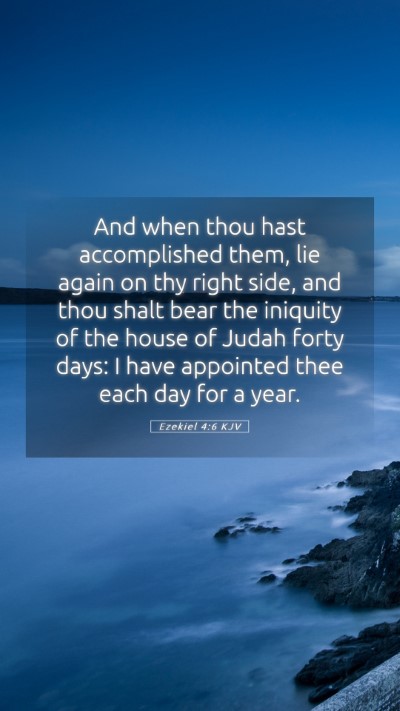Ezekiel 4:6 - Bible Verse Meaning and Interpretation
Bible Verse: Ezekiel 4:6 - "And when you have completed them, lie again on your right side, and you shall bear the iniquity of the house of Judah forty days; each day for a year, I have laid on you a day."
Understanding Ezekiel 4:6
This verse illustrates a symbolic act of judgment portrayed through the prophet Ezekiel. The responsibility of bearing iniquity is conveyed in a striking manner, challenging readers to delve deeper into the context and implications of this prophetic action.
Commentary Highlights
-
Matthew Henry's Commentary:
Henry emphasizes the gravity of Ezekiel's actions as a sign of the impending judgment upon Judah. The symbolic nature of lying on one’s side for an extended period represents the burden of punishment that the people would face due to their disobedience to God.
-
Albert Barnes' Notes:
Barnes elaborates on the concept of transferred guilt. The act performed by Ezekiel symbolically places the sin of the people upon him for a defined period, highlighting God's justice and the seriousness of sin.
-
Adam Clarke's Commentary:
Clarke points to the historical context of Israel’s transgressions that necessitate this judgment. He draws connections between the symbolic acts of the prophet and the realities faced by the nation, serving as a vivid reminder of God’s sovereignty over sin.
Key Themes and Insights
This verse encapsulates several key themes in biblical theology, particularly concerning divine judgment and the prophetic role. Here are some insights to consider:
- Symbolism of Prophecy: The actions of Ezekiel serve as powerful symbols of God’s message to His people. They are intended to provoke thought and reflection among the Israelites regarding their spiritual state.
- Historical Context: The verse is rooted in a time of significant moral decline for Judah. Recognizing this context enhances understanding of the urgency and gravity of the prophetic act.
- Day for a Year Principle: This principle observed in the text signifies how God measures time in the context of judgment and restoration, evoking the significance of each day lived in rebellion.
Cross References
This verse can be cross-referenced with the following:
- Numbers 14:34 - Discusses the principles of years being converted into days of judgment.
- Ezekiel 3:18-19 - Comments on the role of the prophet in warning Israel about their sins.
- Isaiah 53:6 - Explores the burden of sin and iniquity borne by someone for the sake of others, linking to the theme of substitutionary accountability.
Application and Relevance
Understanding Ezekiel 4:6 is vital in grasping the broader narrative of redemption and judgment within Scripture. This verse prompts reflection on how the themes of accountability, judgment, and divine mercy are applicable today:
- It challenges individuals to examine their lives and the collective actions of their communities.
- It reminds believers of the seriousness of sin and its consequences, fostering a call to repentance and restoration.
- It illustrates the powerful role of God’s messengers and their significant impact on society’s understanding of God's will.
Conclusion
Ezekiel 4:6 serves as a vivid reminder of God's judgment and the seriousness with which we must approach His word. Engaging with such passages can transform our understanding and lead to profound spiritual insights. For those involved in Bible study groups or seeking online Bible study resources, this verse embodies the essence of biblical exegesis and the meaning of Bible verses.


